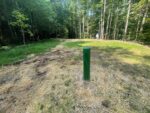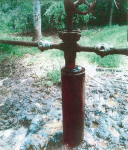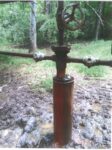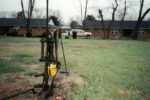- Like
- Digg
- Del
- Tumblr
- VKontakte
- Buffer
- Love This
- Odnoklassniki
- Meneame
- Blogger
- Amazon
- Yahoo Mail
- Gmail
- AOL
- Newsvine
- HackerNews
- Evernote
- MySpace
- Mail.ru
- Viadeo
- Line
- Comments
- Yummly
- SMS
- Viber
- Telegram
- Subscribe
- Skype
- Facebook Messenger
- Kakao
- LiveJournal
- Yammer
- Edgar
- Fintel
- Mix
- Instapaper
- Copy Link
Many surface owners have owned their farmland for generations and want it to remain farmland for future generations. Another scenario is that sometimes landowners who more recently acquired their surface farmland want to see their land saved from development as suburbs or from industrial development. (This can apply to timberland also we are told.) It used to be that if the owner of the farmland did not also own the oil and gas minerals, the farm would not be eligible. That is no longer true. And WVSORO has an opinion by a lawyer familiar with oil and gas issues that can be used to get into a farmland protection program in these circumstances. See below.
One of the biggest challenges to keeping/preserving farmland as farmland is real property taxes. Real property is generally taxed at the value it would have if it was being utilized at its “highest and best use”. For example, suppose a 100-acre farm is surrounded by a sea of suburban subdivision home lots of a quarter acre each. The location of that 100-acre farm in an area of suburban subdivisions means that the land’s most valuable (“highest and best”) use is as 400 additional quarter-acre home lots. So the farm’s value for property tax calculation purposes would be as if it was subdivided and sold as 400 subdivision home lots — and the value of 400 subdivision home lots is much greater than the value of a single 100-acre farm! The result is that the property taxes go up and farmer cannot afford to pay the highest and best use property taxes – so the farmer ends up having to sell the farm, and to sell it to developers — and the farmland is not preserved.
To prevent this from happening there are programs in which the farm owner can sign a farmland conservation easement over to an entity other than the farmland owners that will hold and control those development rights — so the farmland has to stay farmland. Sometimes a non-profit farmland conservation easement holding entity will even pay the farmer for signing over the conservation easement!
(Note: In addition to property tax consequences, there can be federal and state income tax deductions for the farmer conveying the conservation easement! And the sale may affect capital gains tax. All of that is beyond the expertise of WVSORO. If preserving your land as farmland (or maybe even timberland) sounds interesting to you, contact the West Virginia Association of Farmland Protection Boards or another such entity for help with this complicated program.)
For many years, the entities that received and held these farmland protection easements that would preserve the use of the land as farmland would not accept farmland into the program if the surface owners did not also own the oil and gas minerals underneath. That was because the mineral owner had the right to “reasonable use” of the surface to drill for and produce gas and oil. So any day a driller could come bulldozing onto the property and make a well pad and drill a well and send trucks etc. up and down the road to the well pad etc. So the surface did not meet the standards for farmland that made it worth the protection.
However, the work of WVSORO, plus the tsunami of horizontal shale drilling replacing vertical, conventional drilling, has changed things. Because of WVSORO’s win in the EQT vs. Crowder case, the driller cannot use a surface tract for a well pad to drill into mineral tracts that are beyond the boundaries of the mineral tract directly under the surface tract where the well pad is located — not unless the driller has the agreement of the surface owner. Horizontal wells in almost every case bore for distances way beyond the boundaries of the mineral tract directly under the surface tract, and into neighboring mineral tracts. So horizontal well drilling, as a practical matter, always requires surface owner agreement. And in a farmland preservation conservation easement program, the right to agree to use of the surface for oil and gas drilling is given to the entities holding the farmland conservation easement. So the farmland is protected from use for well pads etc. for horizontal wells.
“What about vertical, conventional wells?” you say. If the surface owner does not own the oil and gas minerals, can’t the driller still use the farmland surface to drill a conventional vertical well into the tract directly under the surface tract, and make reasonable use of the surface for the pad and well etc. — won’t that still disqualify the farm from the preservation program? Technically yes, but not in today’s real world. In one calendar year before horizontal shale drilling took over, the State issued more than 2000 vertical, conventional well drilling permits a year. In 2022, after horizontal shale drilling became firmly established, the State only issued 9 vertical, conventional well permits. (And those were probably new wells into secondary recovery oil fields where wells were already drilled.)
So, horizontal wells cannot be drilled on farmland without the agreement of the surface owners and no new vertical wells are going to be drilled. Therefore, the fact that an owner of surface farmland does not own the oil and gas minerals should not block the placement of the farmland in a farmland protection program by giving a conservation easement to an entity that holds such easements.
(Note: If the farmer who owns the surface but does not own the coal, that is a somewhat different problem. But coal production is much less widespread, and there may still be a way to get the farmland into a protection program. That coal problem is beyond the expertise of WVSORO, so we recommend that someone interested in farmland protection that has this problem should contact the West Virginia Association of Farmland Protection Boards or a similar program.)
Farmland protection boards/programs, and surface owners who did not think their surface was eligible for farmland protection, did not know of these developments regarding oil and gas well drilling. Farmland that may not have been eligible for this program before may be eligible now. And even those who did know about the developments in oil and gas drilling had no authoritative documentation for the new eligibility possibility. WVSORO co-founder Dave McMahon was approached. He was asked to give a talk about this to meetings of the West Virginia Association of Farmland Protection Boards. As a result of that, Dave did an opinion letter on his law office letterhead that can be used to educate farmland (and maybe even timberland) owners, farmland protection boards and farmland protection easement holding entities, and even the IRS, so that farmers who do not own the oil and gas minerals owners under their farmland can still participate in farmland protection if they otherwise qualify.
The letter is available here that can be used to participate in farmland protection. There is no charge for using the letter. However, WVSORO functions in part on donations. And if you use this letter please consider making a donation. And if this does not answer all of your questions, please contact us.









